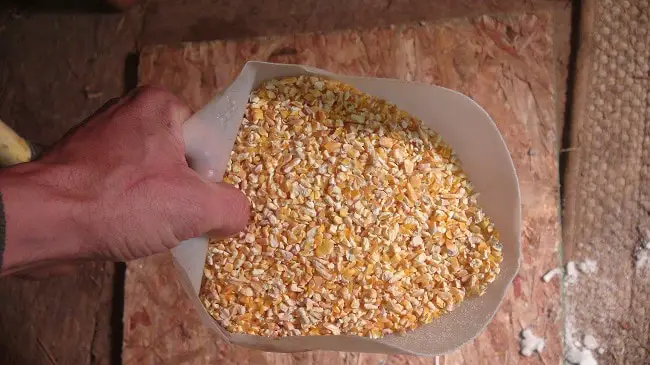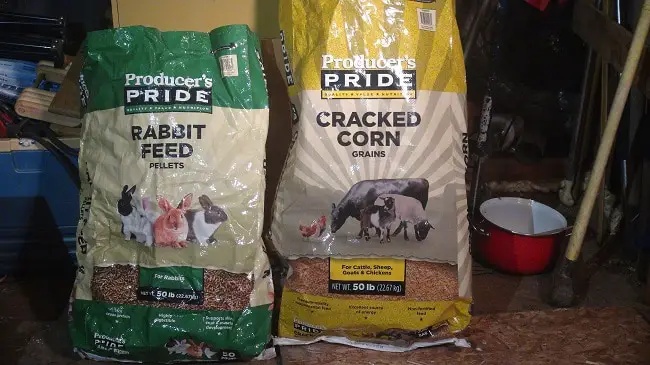Having raised rabbits for 25 years, I’ve tried it all. Most people say rabbits shouldn’t eat corn. I disagree.
Rabbits can eat corn. Corn is an ingredient in most rabbit pellets. Cracked or whole corn can be used in custom formulated rabbit feed mixtures. Corn is a quality whole-grain feed ingredient with good nutrition for rabbits.
There is a ton of misinformation about corn in the animal feed industry. I’ve put in several weeks researching this and conducting my own tests over 4 years to give you the full lowdown.
Can Rabbits Eat Corn?
Rabbits can eat corn, and most rabbits eat corn every day. Corn is often the primary starch component in store-bought feed. Most store-bought feed includes corn to offset fiber-rich ingredients like hay and wheat chaff. Corn increases the energy value, allowing the use of cheaper fiber ingredients in rabbit feed.
Purina, the biggest name in animal feeds, adds corn to its rabbit feed. Purina states “Purina Complete Rabbit diets are Afalfa based for fiber, with corn added as a carbohydrate source”.
They also state”Corn is a natural, wholesome ingredient which has been used in animal and human nutrition for centuries”, and “The addition of corn to our diets supplies necessary energy for your rabbit”.
Rabbits have different feed needs at different life stages, and in different environments. A rabbit nursing a litter of bunnies needs a lot more energy and protein than an unbred rabbit. I just gave a scoop of cracked corn to my momma rabbit for extra energy in her feed.
Supplementing a rabbit’s diet with high-energy foods, like Black Oil Sunflower Seed, Whole Oats, or Cracked Corn are a great way to help them get their energy back after kindling a big litter of bunnies. Most rabbit owners and breeders give their rabbits oats or sunflower seeds but worry about corn.
I will address multiple concerns people have over feeding corn to their rabbits. But first, I’m going to go into the common recommendations given for feed, and the digestive system of rabbits.
Funny enough, there are two different “standard recommendations” depending on the region. In the UK, the recommendation that everybody knows for feeding rabbits is to feed a diet of mostly stemmy hay, with few treats.
One of the primary rabbit authorities in the world (based in the UK) preaches staunchly to feed dry hay and little else or risk malnutrition, obesity, and digestion problems.
Their recommendation for pet rabbits housed indoors to be given a diet of mainly Timothy Hay, Orchard Grass, or other long-stemmed grass. Long-stemmed grasses are low energy and low protein. It may be alright for an adult rabbit that doesn’t have to deal with outdoor temperature drops at night.
The issue is, sometimes a rabbit needs more protein and energy than that. In the US, it’s recommended to feed your rabbits a formulated pelletized rabbit feed made by most any feed company. We also commonly feed grains and sunflower seeds to moms and growing young.
If a rabbit is not growing as it should early on, it’s often an issue of not getting enough milk from its mother. A diet supplement high in fats and starches, like grains and sunflower seeds, helps it to get some additional energy quickly. It’s standard practice even among breeders of top stock.

The high levels of starch within the endosperm of a kernel of corn pose no real risk, as long as it’s kept in moderation. Corn on its own is high in simple starches and low in non-detergent fiber aka, Cellulose. That means that a diet too high in corn will have too little fiber for rabbits. They need a lot of fiber.
Important note:
The corn I’m talking about here is fully dried, large kernel field corn. Not popcorn or sweet corn. My research, tests, and analysis were conducted on common livestock feed corn. There is a potential that other types of corn may have different results than I will talk about below.

Can Rabbits Digest Corn Kernels?
The primary concern about feeding corn to rabbits is that the germ will end up plugging up causing a blockage in the small intestine. I and many other rabbit raisers aren’t so quick to go with this notion. Mainly because we’ve tested and tried, and shared information.
Rabbits are in the category of animals called Lagomorphs. They are hind-gut fermenters, much like a horse. Rabbits have a chamber between the small and large intestine that almost functions as a second stomach. It’s packed full of natural yeasts and bacteria that ferment the semi-digested food.
That’s how they are so good at digesting fibers that we humans can’t. Humans can’t really digest the hull, or germ of a kernel of corn. Neither can pigs for that matter. But animals like horses, cows, rabbits, and goats can somewhat. They rely on the fermentation process to help them.
Still, they can’t digest all of the fibers in corn germ. That’s a good thing. They also can’t digest all the fiber in grasses or alfalfa hay. You can see the fiber in their little poops. That brings me to my next point of research. Time for a little science.
Now, I have personally conducted an analysis of the fecal remains of 27 rabbits over a 4-month time frame. During that time frame, they were fed pellets, and an increasing amount of dried, whole kernel corn. Yes, I checked their poop every day for a third of the year; in the name of science.
I inspected them visually, then dried them and broke them apart to see the size of fibers they contained. I saw no visible difference from the no corn diet, to the 20 percent corn diet. I saw a slight change with the 30 percent corn diet. Mostly a color change. There was perhaps a slight change in the shape of some fibers, but not in the size of them.
I’ll also note that mine were large breed rabbits between 10 weeks and 3 years old.
Fun Fact: Half of the protein rabbits need actually comes from the digestion of bacteria in the hind gut. The bacteria break down complex cellulose fibers into starches, and the bacteria are then digested with the food as it passes through the gut.
Is Corn Toxic to Rabbits?
Let’s move on to another common misconception; that corn contains substances that are toxic to rabbits. I’ve heard this on in both the rabbit circle and among the horse crowd. No, corn isn’t toxic. The people who actually research things a bit will say that corn can be contaminated with Mycotoxins.
Mycotoxins are a class of chemicals released by some molds that are toxic to both animals and humans. These types of mold can grow on any type of grain in very wet conditions. Fortunately, it’s incredibly rare. Livestock feed ingredients are tested for these compounds before and after harvest.
It’s of no practical concern. The animal feed industry is very strictly regulated about these things today. farmers don’t want to sell bad grains. One bad batch and he’s ruined in the business for good. Feed companies also monitor and test their grains for potential issues before use.
Is There Corn in all Rabbit Feed?
The locally-made rabbit feed I buy contains corn. Many do, some don’t. All pelletized rabbit feeds that I’ve ever seen contain some sort of grains for energy, and usually soy to up the protein. Around here, corn is by far the cheapest grain so it’s used more often.
By grinding it to a meal you can’t have any concerns about the germ plugging up a rabbit’s digestive tract. Ground corn is a great additive to rabbit feed. In fact, at one point, it was recommended by the USDA! It’s true. In my grandparent’s day, the Department of Agriculture was running tests on rabbits.
They were breeding and raising rabbits for meat and determined cracked corn to be the best grain to grow out a rabbit. That is, feed it from weaning to butcher size. They actually fed just corn to hundreds of rabbits for several months on a regular basis, for years. When used as a feed for meat rabbits that will be butchered at 12 weeks, they reported that “rabbits raised on corn show good gains”.
Can Corn Cause a Rabbit to Overheat?
Now here’s an interesting one. I spent so many hours researching it. The fancy word for it is thermogenesis. That means to create or generate heat. Now, rabbits possess brown adipose tissue also called brown fat. Brown fat can actually create heat by its special metabolic process of thermogenesis.
It’s induced by both adrenaline and intake of food, which is kind of weird, but eh’ it’s nature. The weirder thing is that the brown fat in rabbits doesn’t really seem to do this. However, some researchers think that an excess of high-energy food may, as opposed to regular rabbit feed, can induce adipose thermogenesis in rabbits.
But, they couldn’t agree amongst themselves about it. This one is still up in the air. Some rabbit owners swear that corn will increase the animal’s temperature, keeping it warm in winter or overheating it in summer.
High starch diets can cause a small amount of increased heat within the gut of a rabbit. The fermentation stage of their digestion creates extra heat. A high starch diet can cause a slightly higher level of heat in a rabbit’s gut. How much? Not very much it seams.
There’s not been any actual research into this to my knowledge. It’s not like a high-starch diet will cause your rabbit to be noticeably warmer to the touch. I’ve yet to find a circumstance where the high-starch diet actually raised the body temperature of an animal.
However, if you are in a very hot environment, there’s not as much use to feed a high-energy diet like there is in colder regions. This is a part with anecdotal information, but not much of anything very sound. All I can say is it may contribute to an issue and you may want to not include extra starch-rich feed in your rabbit’s diet during extremely hot temperatures.
Does Corn Cause Bloat in Rabbits?
Overuse of corn in a rabbit’s diet can lead to digestive problems including Bloat. It can increase the number of bacteria in the gut, greatly increasing the rate of fermentation. That can cause a buildup of gas, known as bloat.
Bloat is a fickle thing in rabbits. It’s generally thought to be caused by a quick imbalance in the gut flora. I have found absolutely no information that any grains are involved with any potential increased risk of bloat. Sometimes it’s thought that a quick change in feed can result in an imbalance of gut flora and potentially result in bloat.
Long-term overuse of grains can cause problems stemming from too high of starch levels in the hindgut of a rabbit. Basically, the yeast and bacteria in the gut can get wonky off balance, causing gastric problems. Rabbits need a lot of fiber in their diet to prevent this from happening.
Bloat, while uncommon, seems to occur fairly randomly. It’s very serious and there is often little you can do but pray. Corn, won’t cause bloat. I feel pretty confident in saying that. I will say it again though, corn is not a complete feed for any period of time except if butchering soon apparently.
A few Related Articles:


